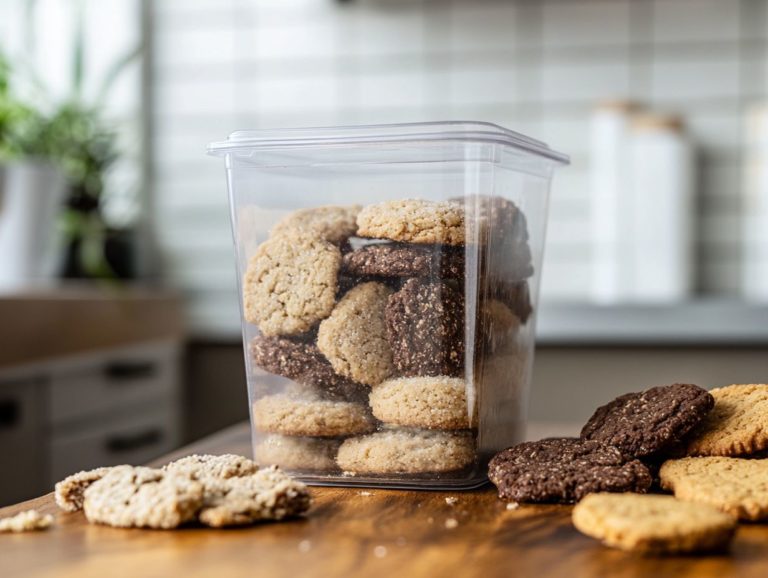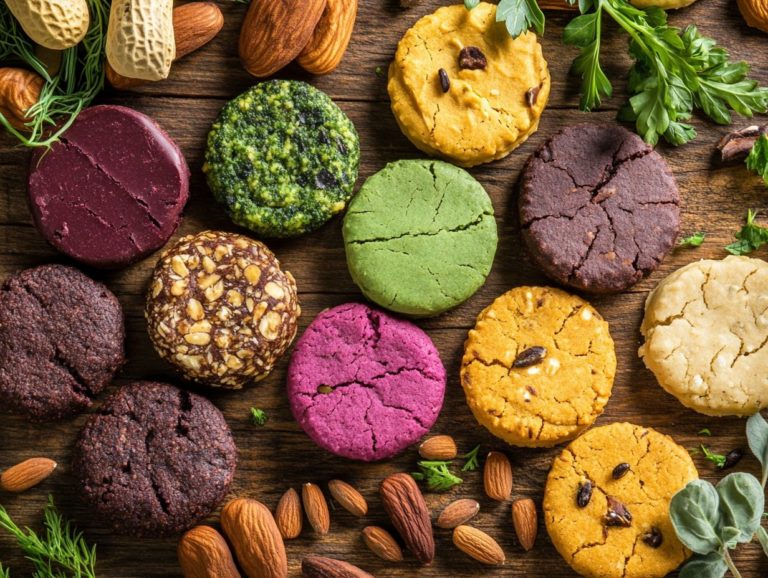The Science Behind Baking Plant-Based Cookies
Plant-based cookies are becoming increasingly popular, celebrated not only for their delectable flavors but also for their impressive health benefits, positive environmental impact, and the growing market demand for vegan treats.
If you ve ever contemplated what sets these cookies apart from their traditional counterparts, you re about to embark on an enlightening journey.
This article delves into the unique ingredients that characterize plant-based cookies, examining how they influence the baking process and the role of leavening agents like baking powder and baking soda, while offering valuable tips for perfecting your own recipes.
From grasping the nuances of texture and taste to exploring exciting alternatives, you ll uncover the art of crafting delightful plant-based treats, including chocolate chip cookies, that are not just good for you but also kind to the planet.
Contents
- Key Takeaways:
- Why Choose Plant-Based Cookies Over Traditional Cookies?
- What Ingredients Are Used in Plant-Based Cookies?
- How Do These Ingredients Affect the Baking Process?
- Nutritional Value
- What Are Some Tips for Baking Plant-Based Cookies?
- 3. Baking Time and Temperature
- Can Plant-Based Cookies Be Made Without Using an Oven?
- How Can You Make Your Own Plant-Based Cookie Recipes?
- 1. Experimenting with Different Ingredients
- Frequently Asked Questions about Plant-Based and Vegan Baking
- 1. What is the science behind baking plant-based cookies and vegan treats?
- 2. Why are plant-based ingredients used in cookie baking, and what are their health benefits?
- 3. How do plant-based cookies differ from traditional cookies like chocolate chip cookies?
- 4. Can you substitute all ingredients in a cookie recipe with plant-based alternatives like those in vegan baking?
- 5. How does the type of flour and other ingredients used affect plant-based cookie baking?
- 6. Are plant-based cookies suitable for people with food allergies and those following a plant-based lifestyle?
- 2. Substituting Ingredients in Traditional Cookie Recipes
Key Takeaways:
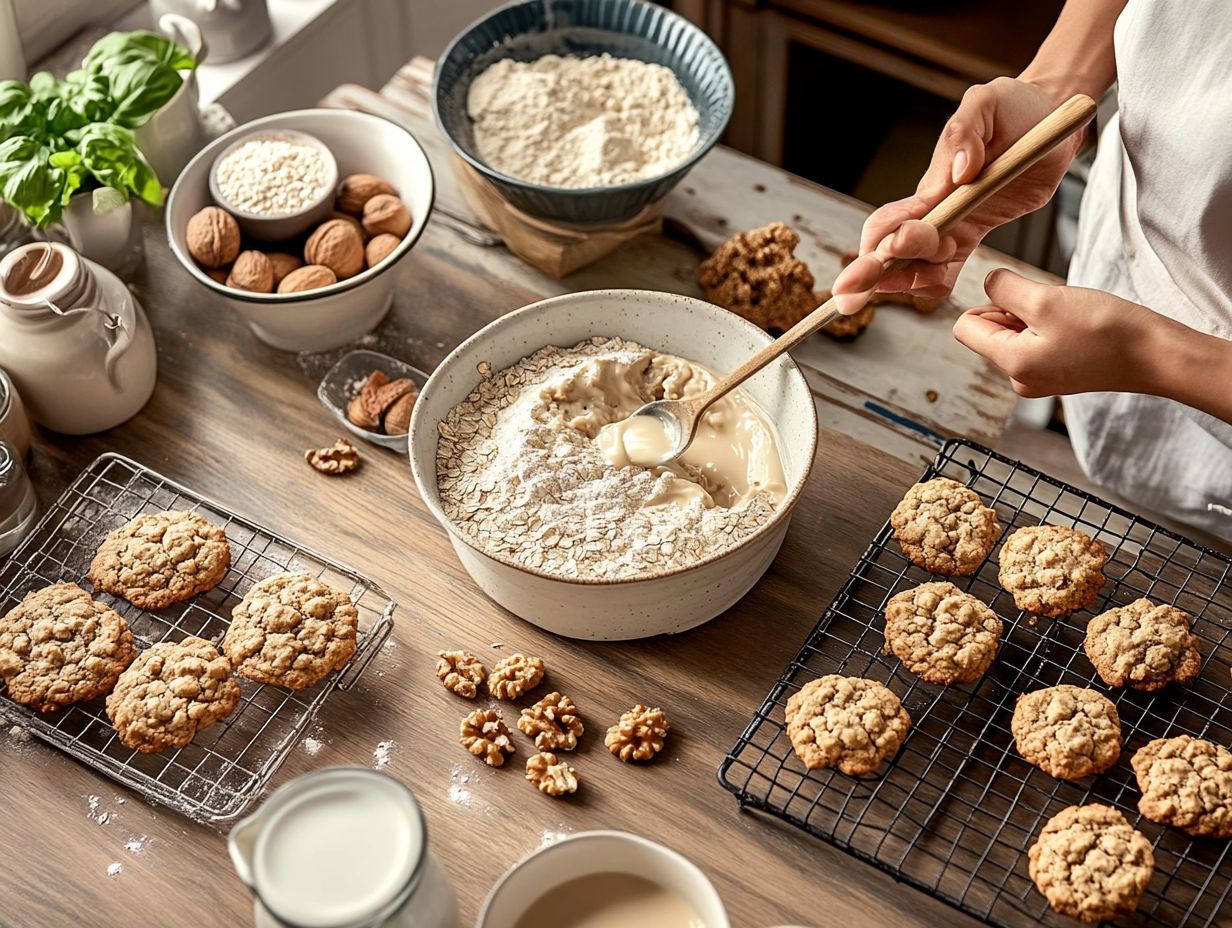
- Plant-based cookies offer health benefits and have a lower environmental impact compared to traditional cookies, thanks to the use of vegan ingredients like aquafaba and plant-based oils.
- Ingredients like flour alternatives, natural sweeteners, egg replacements, and dairy alternatives are used in plant-based cookies, enhancing their flavor and texture while maintaining moisture retention.
- These ingredients affect the texture, taste, and nutritional value of plant-based cookies, making them a healthier option and showcasing the science behind vegan baking.
Why Choose Plant-Based Cookies Over Traditional Cookies?
Plant-based cookies present a delightful alternative to their traditional counterparts, offering an array of health benefits and environmental perks that make them an enticing option for anyone pursuing a healthier lifestyle.
By swapping out ingredients like butter and eggs for vegan alternatives such as aquafaba (the liquid from cooked chickpeas, a popular egg substitute) and plant-based oils, you can craft cookies that not only satisfy your sweet tooth but also reflect your commitment to sustainability.
With their unique flavor profiles and textures, these vegan treats cater to a variety of dietary preferences while making a positive contribution to both your personal health and the well-being of the planet.
1. Health Benefits
The health benefits of choosing vegan cookies are truly impressive, especially if you’re aiming to elevate your overall well-being without sacrificing the joy of flavor and experimenting with new recipes.
These delightful treats typically contain lower levels of saturated fat compared to traditional cookies, making them a heart-friendly choice.
Instead of refined sugars, vegan cookies often incorporate natural sweeteners like maple syrup and agave nectar, which not only enhance the flavor but also provide essential nutrients.
Ingredients such as oats, almonds, and chia seeds are packed with fiber, vitamins, and minerals, supporting digestion and promoting a satisfying sense of fullness.
By opting for cookies made with plant-based ingredients, you can indulge without guilt and delight in every bite!
2. Environmental Impact
The environmental impact of baking vegan cookies is often significantly lower than that of traditional cookie recipes, as they typically require fewer resources and generate less waste.
Choosing plant-based ingredients reduces carbon emissions related to livestock farming and dairy production.
Ingredients like almond flour and coconut oil not only elevate the flavor but also consume less water during their cultivation compared to conventional dairy or egg-based components.
This shift towards vegan baking champions sustainable agricultural practices, promoting the use of crops that are less resource-intensive and capable of thriving in various environments.
Ultimately, embracing a vegan approach not only nurtures the environment but also paves the way for a healthier, more sustainable future.
What Ingredients Are Used in Plant-Based Cookies?
Plant-based cookies are crafted with an array of carefully chosen ingredients, ensuring that every bite offers a delightful taste and texture while embracing a vegan lifestyle.
You ll find wholesome whole grain flours, natural sweeteners like stevia or maple syrup, and inventive egg replacements such as aquafaba or flaxseed meal, all contributing to the unique taste and consistency of these delightful treats. Understanding how some ingredients absorb water can help you achieve the perfect dough consistency.
Get creative and whip up irresistible vegan cookies that everyone will love!
1. Flour Alternatives
Flour alternatives are essential in vegan baking, offering you a wealth of options whether you’re managing gluten sensitivities or simply eager to explore diverse textures and flavors through various baking techniques.
These alternatives can elevate your baking experience, unlocking a world of cooking options. Take almond flour, for example; made from finely ground almonds, it not only adds a delightful nutty flavor but also lends a tender, moist texture to your cookies thanks to its high fat content.
Oat flour, derived from ground oats, brings a subtle sweetness and exceptional moisture retention, resulting in soft and chewy baked goods. Then there’s coconut flour, which, while highly absorbent, requires precise measurement and a bit of extra liquid in your recipes. However, it rewards you with a unique taste and an added fiber boost.
Each of these flour alternatives can also deliver various health benefits, such as improved nutrient profiles and lower glycemic indices, making them perfectly aligned with numerous dietary preferences. Substituting traditional flour with these alternatives can significantly affect the dough consistency.
2. Natural Sweeteners
Natural sweeteners are essential in vegan cookie recipes, providing you with healthier alternatives to granulated sugar while enhancing the overall flavor profile.
Consider exploring options like stevia, coconut sugar, and agave syrup; each offers a delightful twist to traditional baking. Stevia, for instance, is a zero-calorie sweetener that delivers a concentrated sweetness, allowing you to significantly cut down on granulated sugar without sacrificing flavor perfect for those mindful of their caloric intake.
Coconut sugar, on the other hand, brings a rich, caramel-like flavor that closely mimics brown sugar, seamlessly integrating into your recipes while keeping taste intact. Then there’s agave syrup, known for its mild sweetness and lower glycemic index, which can serve as an ideal liquid sweetener that maintains moisture in your cookies.
Each of these alternatives not only contributes its unique flavor but also offers health benefits, making them excellent substitutes in a variety of baked goods.
3. Egg Replacements
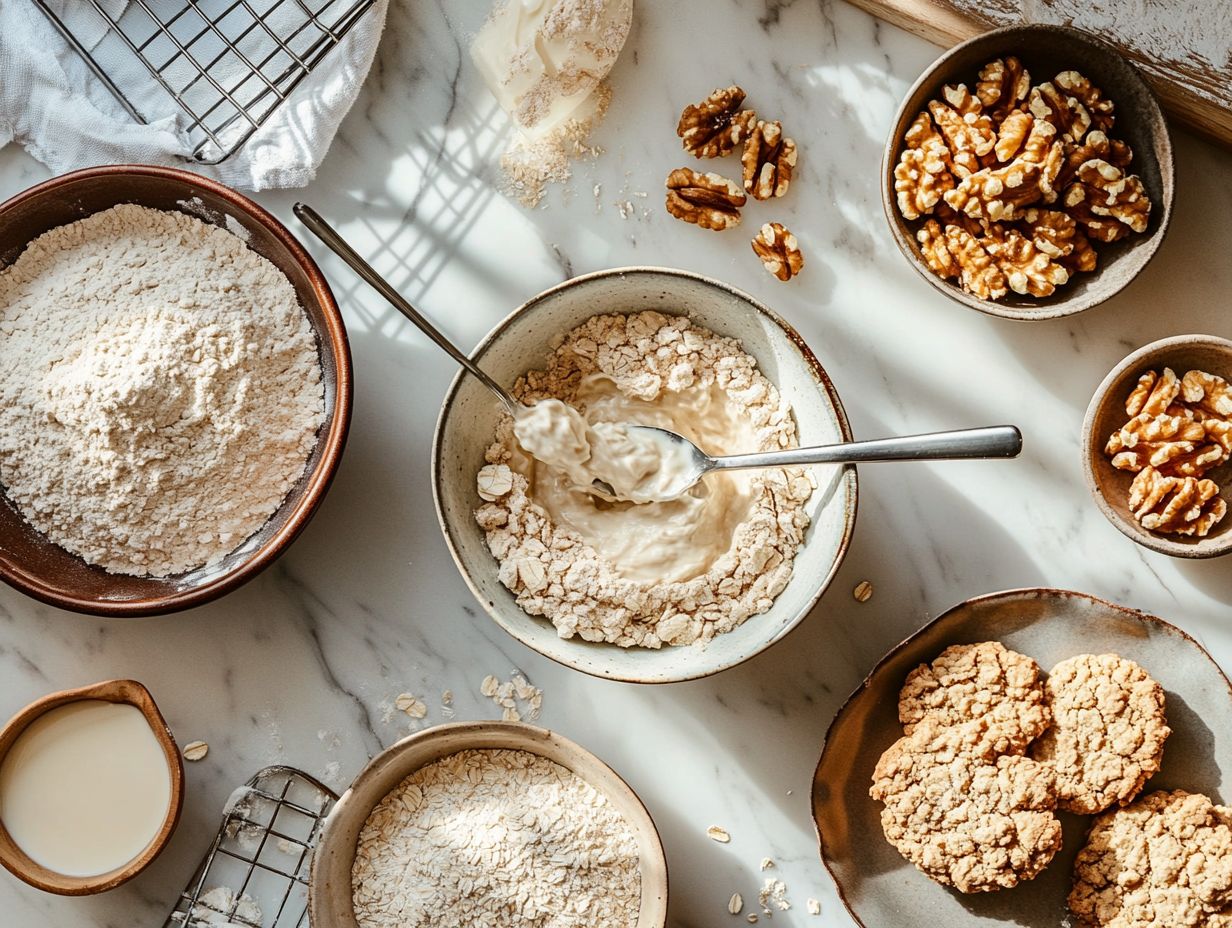
You need egg replacements to achieve the perfect consistency and moisture in your vegan cookies, ensuring they remain delightfully chewy and bursting with flavor.
These alternatives are instrumental in mimicking the binding properties of eggs while also keeping moisture intact. For example, aquafaba the liquid from cooked chickpeas can be whipped to create a light and airy texture, serving as an excellent leavening agent for delicate baked goods. Similarly, flaxseed meal and chia seeds, when mixed with water, develop a gel-like consistency that not only binds your ingredients but also enhances moisture content.
These substitutes help your cookies rise perfectly while maintaining that irresistible chewiness, all without sacrificing taste. Experimenting with different egg substitutes can also reveal surprising benefits to cookie texture and flavor.
Try experimenting with these ingredients and watch your vegan cookies become a hit!
4. Dairy Alternatives
Dairy alternatives are essential for crafting delicious vegan cookies that replicate the rich creaminess typically delivered by butter and milk.
Experimenting with these substitutes can yield unique flavors and improve cookie texture.
Consider options like coconut oil, almond milk, and vegan butter, which can significantly enhance your baking experience. Coconut oil not only imparts a subtle tropical flavor but also contributes to a melt-in-your-mouth texture, boosting the moisture content that makes cookies utterly irresistible.
Almond milk, on the other hand, adds a delicate nutty sweetness that elevates the overall taste profile. Meanwhile, vegan butter closely mimics the buttery essence you crave, delivering a smooth, creamy consistency that keeps your cookies soft and chewy.
When combined, these alternatives have the power to transform a simple recipe into a sweet treat, allowing you to savor the comforting goodness of cookies without sacrificing your dietary preferences.
How Do These Ingredients Affect the Baking Process?
Understanding Ingredient Impact on Texture and Flavor
The baking process for vegan cookies is profoundly shaped by your choice of ingredients, which directly impacts their texture, flavor, and nutritional profile. For example, opting for almond flour instead of all-purpose flour can result in a denser cookie, whereas the type of sweeteners you select will influence both the sweetness and moisture levels of the final product.
Understanding how these ingredients interact during the baking process empowers you to create sensational cookies that wow your friends!
This knowledge allows you to experiment confidently with your recipes, enabling you to craft a delightful assortment of sweet treats that cater to a variety of tastes. You can manage factors like water content and chemical reactions more effectively.
1. Texture
The texture of your vegan cookies can fluctuate dramatically based on the ingredients you choose, giving you the freedom to craft either chewy or crunchy delights to suit your taste.
Understanding the role of emulsifiers and flavor compounds can further enhance your baking experiments. Take flour, for example; the kind you opt for plays a pivotal role. All-purpose flour typically results in a lighter texture, while whole wheat flour adds a denser, more substantial quality.
The fats you incorporate, such as coconut oil or vegan butter, also have a significant influence on the final product coconut oil tends to lend a wonderful chewiness, while vegan butter can create a more tender bite.
To achieve your ideal cookie, it s crucial to fine-tune your baking times. A longer bake can bring a delightful crispness, while pulling them out a bit earlier results in soft, gooey centers.
Dive into these techniques and unlock endless possibilities for your dream vegan cookie!
2. Taste
Taste plays a crucial role in your vegan cookie journey, as the flavor compounds derived from natural sweeteners and alternative ingredients significantly enhance your overall experience.
These elements do more than just add sweetness; they infuse each bite with depth and complexity. For example, a touch of vanilla extract can elevate the flavor profile, making your cookies taste richer and more inviting.
On the other hand, chocolate chips bring a delightful contrast, offering bursts of flavor that harmonize beautifully with the sweetness. Achieving the perfect balance requires careful measurement of these ingredients, ensuring that no single flavor overpowers the others.
This meticulous attention to detail enables you to create cookies that are not only satisfying but also memorable, showcasing the remarkable versatility of vegan baking.
Nutritional Value
The nutritional value of vegan cookies can be significantly higher than traditional cookies. They offer health benefits suited for those who prioritize wellness.
This enhancement primarily arises from the thoughtful ingredient choices typical of plant-based recipes. By incorporating whole grains, nuts, and seeds, these cookies often boast a higher fiber content, which supports digestive health and promotes a sense of fullness.
Healthy fats from ingredients like nut butters can contribute positively to heart health. Reducing the use of refined sugars an all-too-common element in conventional baking results in a lower glycemic index. By utilizing natural sweeteners, vegan cookie recipes present a more balanced alternative that not only satisfies your sweet cravings but also aligns seamlessly with a health-conscious lifestyle, making them an appealing choice for anyone looking to elevate their nutritional intake.
What Are Some Tips for Baking Plant-Based Cookies?
Baking plant-based cookies demands your careful attention to detail, making it essential to adhere to specific tips that guarantee success every time. Precise measurements of ingredients are vital, as even minor discrepancies can alter the consistency of the dough, ultimately impacting both texture and flavor.
Using the correct mixing techniques and keeping a close eye on baking time and temperature can significantly elevate the quality of your cookies. This results in delightful treats that are both delicious and satisfying for any palate.
1. Proper Measurements

When baking plant-based cookies, precise measurements of your ingredients are essential for achieving the perfect consistency and flavor.
Accurate measurement is key; even the slightest deviations can dramatically affect the texture and taste of your finished treats. For example, using too much flour might result in dry, crumbly cookies, while not adding enough liquid could lead to dense, unappetizing confections.
To help you achieve baking perfection, it s important to employ tools like kitchen scales and measuring cups, especially when you’re working with the varying densities of dry and wet ingredients.
When swapping traditional ingredients for vegan alternatives like almond milk instead of dairy or aquafaba, the liquid from cooked chickpeas, in place of eggs grasping their conversion ratios will be your secret weapon for maintaining the ideal balance in your recipes and ensuring successful baking endeavors.
2. Mixing Techniques
Employing the right mixing techniques is essential in your baking process, as it significantly influences the incorporation of ingredients and the overall texture of your vegan cookies.
Take the creaming method, for example: it involves beating together sugar and fat until they reach that ideal light and fluffy state. This technique is crucial for creating a light texture and evenly distributing air throughout the batter, resulting in cookies that are both tender and chewy.
Conversely, the folding method comes into play when you re working with delicate ingredients, like aquafaba or whipped flaxseed. This gentle technique ensures that those precious air bubbles stay intact, leading to a more airy and balanced cookie.
By understanding these different mixing methods and their specific impacts, you can refine your vegan baking skills, achieving the desired consistency and taste in every batch.
Ready to try baking your own delicious plant-based cookies? Grab your ingredients and get started on your baking adventure!
3. Baking Time and Temperature
Baking time and temperature are key factors that can greatly influence the success of your vegan cookies. Striking the right balance between these elements is essential; even a minor tweak can lead to very different results.
Baking at a higher temperature can crisp the outside quickly while keeping the inside soft and chewy. Lowering the temperature allows for a more even bake, resulting in a tender, cake-like texture.
It’s best to preheat your oven to a range of 350 F to 375 F. Keep a close eye on your cookies and check for doneness just a few minutes before the recommended baking time.
Incorporating ingredients like flaxseed or aquafaba, which is the liquid from canned chickpeas used as an egg substitute, can elevate your cookies even further. Enjoy the journey of baking!
Can Plant-Based Cookies Be Made Without Using an Oven?
Absolutely, you can create plant-based cookies without an oven by embracing innovative alternatives that yield delicious results without the need for traditional baking methods.
If you re eager to indulge in homemade sweets, consider these creative options:
- No-bake recipes that often blend ingredients like oats, nut butter, and sweeteners.
- A quick spin in the microwave for fluffy treats in mere minutes, perfect for a fast snack or dessert.
- Stovetop cooking techniques that transform simple ingredients into mouthwatering cookies, satisfying any sweet tooth all without ever turning on the oven.
How Can You Make Your Own Plant-Based Cookie Recipes?
Creating your own plant-based cookie recipes offers a thrilling opportunity to experiment with an array of flavors and textures, enabling you to customize cookies to align perfectly with your preferences and dietary requirements.
By grasping the essential ingredients that shape cookie structure and taste such as sugar, flour, and fats you enable yourself to make thoughtful substitutions and adjustments, ensuring a delightful baking experience.
Whether you choose to infuse new flavor compounds or delve into innovative ingredient swaps, the possibilities for crafting unique vegan cookies are truly limitless.
1. Experimenting with Different Ingredients
Experimenting with different ingredients can transform your vegan cookie creations into a realm of exciting new flavor profiles and textures.
By mixing and matching various flours think almond, oat, or spelt along with unconventional sweeteners like maple syrup, agave nectar, or coconut sugar, you can unlock a delightful array of possibilities. Elevate your cookie experience by incorporating unique flavorings such as vanilla extract, almond essence, or warming spices like cinnamon and nutmeg.
Pay attention to the ratios and compatibility of these ingredients to achieve the best results, allowing your experimentation to be both enjoyable and fruitful. Remember how different combinations can influence the cookie s texture, chewiness, or crispiness, paving the way for unparalleled adventures in vegan baking.
So, what exciting combinations will you try next?
Frequently Asked Questions about Plant-Based and Vegan Baking
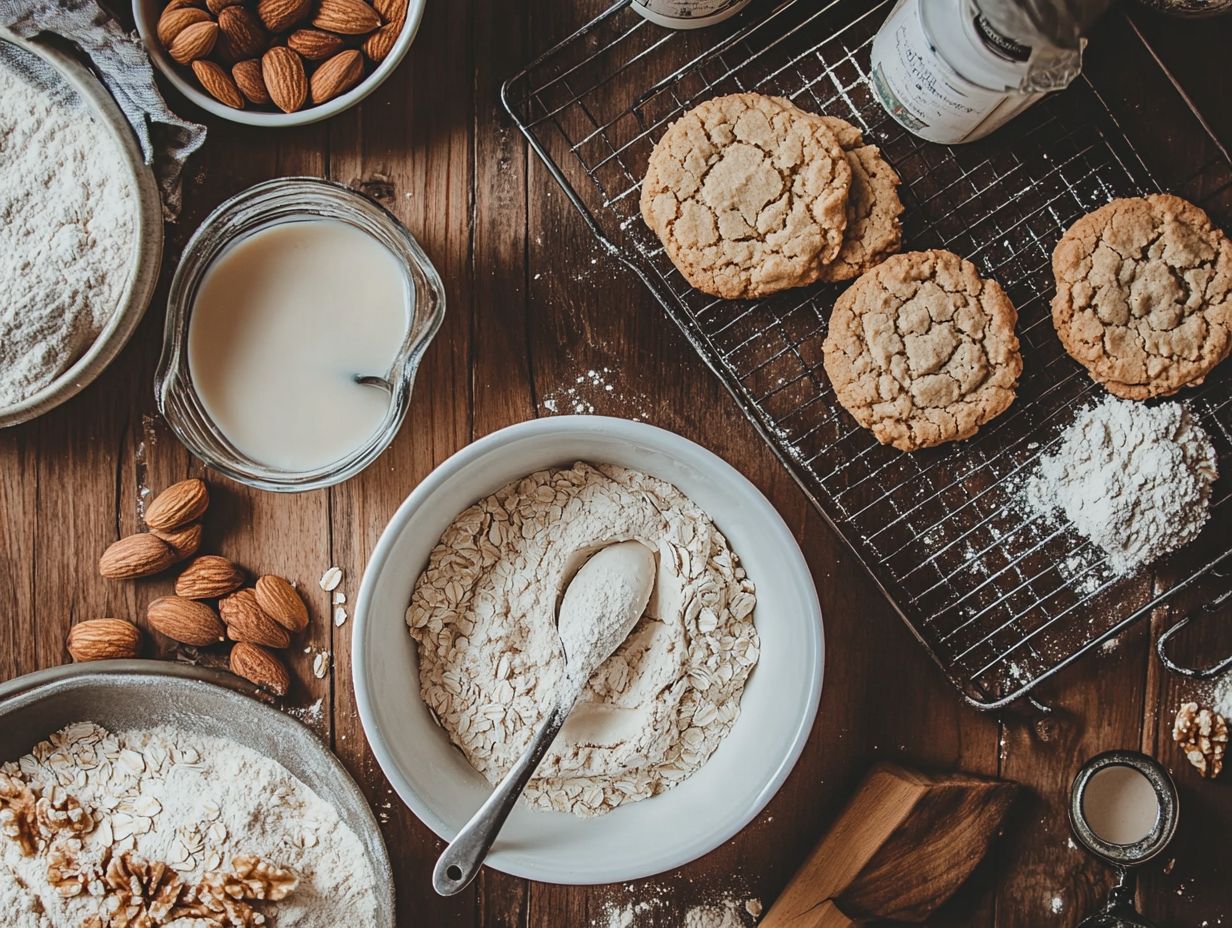
1. What is the science behind baking plant-based cookies and vegan treats?
The science behind baking plant-based cookies involves understanding the properties of plant-based ingredients and how they react to different baking techniques. It also means adjusting traditional cookie recipes to accommodate the lack of eggs and dairy.
For instance, knowing how gluten and leavening agents like baking soda and baking powder interact can make all the difference.
2. Why are plant-based ingredients used in cookie baking, and what are their health benefits?
Plant-based ingredients, such as flaxseed, applesauce, and coconut oil, are popular in cookie baking because they offer a healthier and more sustainable alternative to traditional ingredients like butter and eggs. They also provide unique flavors and textures to baked goods.
Using vanilla extract and stevia as sugar substitutes can enhance the flavor and make your vegan treats even tastier!
3. How do plant-based cookies differ from traditional cookies like chocolate chip cookies?
Plant-based cookies differ from traditional cookies in texture and taste. They may be slightly denser and chewier due to the absence of eggs, but they can still be just as delicious. They often have a more wholesome, nutty flavor.
The use of different mixing methods and flours can result in various textures and flavors.
4. Can you substitute all ingredients in a cookie recipe with plant-based alternatives like those in vegan baking?
No, not all ingredients in a cookie recipe can be substituted with plant-based alternatives. For example, butter can be replaced with coconut oil, but eggs cannot be replaced with just one plant-based ingredient.
A combination of ingredients, such as flaxseed and water, can serve as an egg replacement. Aquafaba, the liquid from canned chickpeas, is another excellent egg substitute that works wonderfully in vegan baking!
5. How does the type of flour and other ingredients used affect plant-based cookie baking?
The type of flour can greatly affect the outcome of a plant-based cookie. For instance, whole wheat flour will produce a denser and heartier cookie than all-purpose flour.
It’s important to experiment with different flours to find the right texture and taste for your plant-based cookies. Also, consider the water content and moisture retention properties of different flours.
6. Are plant-based cookies suitable for people with food allergies and those following a plant-based lifestyle?
Plant-based cookies can be a great option for people with food allergies, as they do not contain common allergens like eggs and dairy.
However, it’s crucial to always double-check ingredients and labels to ensure that the cookies are safe for your specific allergies. With plant-based foods becoming more mainstream, it’s easier now to find dairy-free and organic options in the market.
2. Substituting Ingredients in Traditional Cookie Recipes
Substituting ingredients in traditional cookie recipes is a great way to create vegan-friendly treats without compromising on taste.
By thoughtfully selecting alternatives, you can achieve the same tasty flavors and textures that define classic cookies. For example, swapping out butter for plant-based margarine or coconut oil not only makes the recipe free of animal products but also introduces unique flavors that elevate your creation.
Try using aquafaba the liquid from canned chickpeas in place of eggs. It whips up beautifully, providing both structure and moisture to your cookies.
While these substitutions may subtly influence the baking process, perhaps by adjusting cooking times or methods, they ultimately result in cookies that are just as scrumptious and satisfying as their traditional counterparts. For a vegan alternative, you can also try using Earth Balance as a butter substitute.



